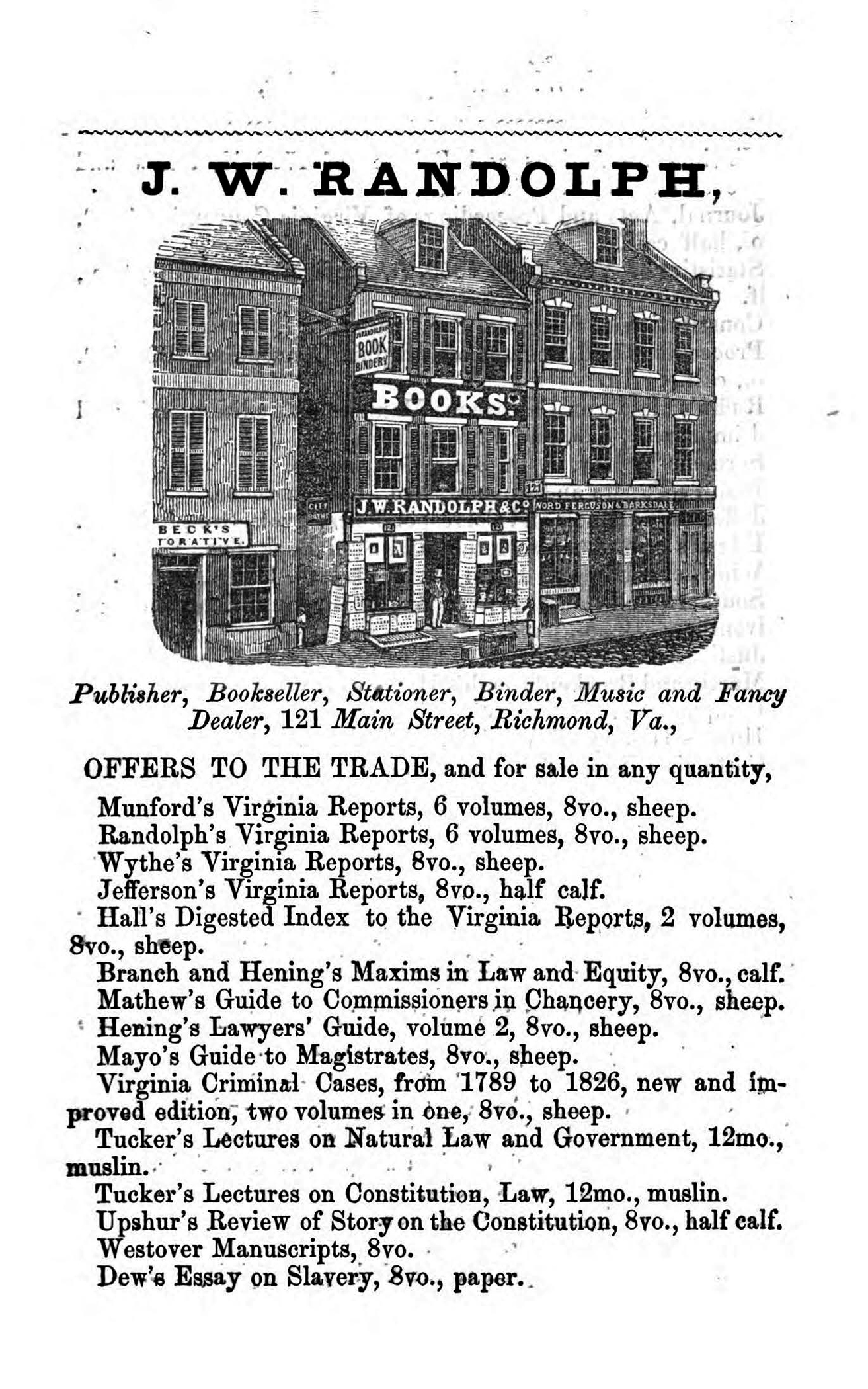Decisions of Cases in Virginia, by the High Court of Chancery (1852)
by George Wythe
| Wythe's Reports | |
|
Title page from Decisions of Cases in Virginia by the High Court of Chancery, George Wythe Collection, Wolf Law Library, College of William & Mary. | |
| Author | George Wythe |
| Editor | B. B. Minor |
| Published | Richmond: J.W. Randolph |
| Date | 1852 |
| Edition | 2nd and only complete ed. |
| Language | English |
| Pages | xliii, 478 |
| Desc. | 8vo. (22 cm.) |
| Location | Shelf G-3 |
George Wythe (1726 – 1806), American legal scholar, politician, and judge, provided substantial contributions to the jurisprudence of a young nation.[1]
Wythe served various roles throughout his career, two of which provide context for his Decisions of Cases in Virginia, by the High Court of Chancery. One produced a rivalry, and the other deep enmity, with one of his contemporaries, Edmund Pendleton. It was from this rivalry that Wythe’s Reports sprang.[2]
Wythe first encountered Pendleton in the practice of law, as they were frequent adversaries in court.[3] While Wythe exceeded in formulating complex, logically sounds arguments, Pendleton possessed the gift of eloquence.[4] Often this led to Pendleton winning cases with a weaker argument, as Wythe’s complex arguments often exceeded the comprehension of the jury.[5] The friction generated between these steadfast competitors in these early years evidently sowed the seeds of a life-long rivalry.
Eventually, Wythe and Pendleton both served as judges for the High Court of Chancery, where, despite frequent compromise, their political differences became evident.[6] While Wythe favored going beyond precedent to establish new policies for the young nation, Pendleton favored a more conservative approach.[7] This was most visible in Wythe’s decision in Commonwealth v. Caton where he disagreed sharply with Pendleton’s willingness to absolve the legislature of overstepping its bounds and posited an early version of judicial review.[8]

The rivalry reached its zenith when Pendleton was elevated to the Supreme Court of Appeals.[9] This enabled Pendleton to overrule or alter Wythe’s opinions in final, binding decisions, a power he exercised in a majority of Wythe’s cases.[10] Wythe was not one to let his opponent have the last word, and his reports were a means of publicizing his ideas.[11] The reports "[i]ndicate just how erudite, how deeply learned in the law Wythe really was."[12] In going beyond precedent, Wythe drew from a wide variety of sources in reaching his conclusions, including classical literature.[13] And although Wythe was usually known as being mild and impartial, his work contained remarks that were "unrestrainedly caustic" in attacking Edmund Pendleton.[14] In addition, Wythe designed his reports so that the final opinion put Pendleton in the most negative light.[15]
After publishing Decisions of Cases in Virginia, by the High Court of Chancery in 1795, Wythe became fatalistic, knowing that his opinions were bound to be altered or overturned by his rival.[16] Nevertheless, he continued publishing additional opinions in pamphlet form.[17] The 1852 edition of Wythe's Reports contains the original work as well as these additional materials.[18] Missing are only two cases unavailable to the editor at the time: Love v. Donelson, and Overton v. Ross.[19]
Evidence for Inclusion in Wythe's Library
Published in 1852, forty-six years after his death, clearly Wythe did not own the second edition of his own case reports. However, the volume represents the most complete version of his reports, and is prefaced by a 26-page "Memoir of the Author" by the editor, B.B. Minor. It was the most extensive biography of Wythe at that time. The Wolf Law Library moved an existing copy from the general rare books collection to the George Wythe Collection.
Description of the Wolf Law Library's Copy
View the record for this book in William & Mary's online catalog.
See also
References
- ↑ John E. Selby, “Wythe, George (1725/6-1806)” in Oxford Dictionary of National Biography, accessed March 28, 2014.
- ↑ E. Lee Shepard, "George Wythe," in The Virginia Law Reporters Before 1880, ed. W. Hamilton Bryson (Charlottesville: University of Virginia Press, 1977), 92.
- ↑ Ibid.
- ↑ Ibid.
- ↑ Ibid.
- ↑ Ibid., 93.
- ↑ Ibid.
- ↑ Ibid.
- ↑ Ibid.
- ↑ Ibid.
- ↑ Ibid., 93-94.
- ↑ Ibid., 94.
- ↑ Ibid.
- ↑ Ibid.
- ↑ Ibid.
- ↑ Ibid.
- ↑ Ibid.
- ↑ Ibid., 95.
- ↑ B.B. Minor, the editor of the second edition, had access to a bound volume of pamphlets which was then in the possession of William Green of Culpeper, Virginia. It contained pamphlets for the Report of the Case between Aylett and Aylett, Report of the Case between Field and Harrison, Case upon the Statute for Distribution, Between Wilkins and Taylor, Between Fowler and Saunders and Between Goodall and Bullock, and Between Yates and Salle. George Wythe, Decisions of Cases in Virginia, by the High Court Chancery, with Remarks upon Decrees by the Court of Appeals, Reversing Some of Those Decisions, ed. B.B. Minor (Richmond, VA: J.W. Randolph, 1852), xli-xliii.
External links
- Read this book in Google Books.
- Read this book at LLMC Digital.
